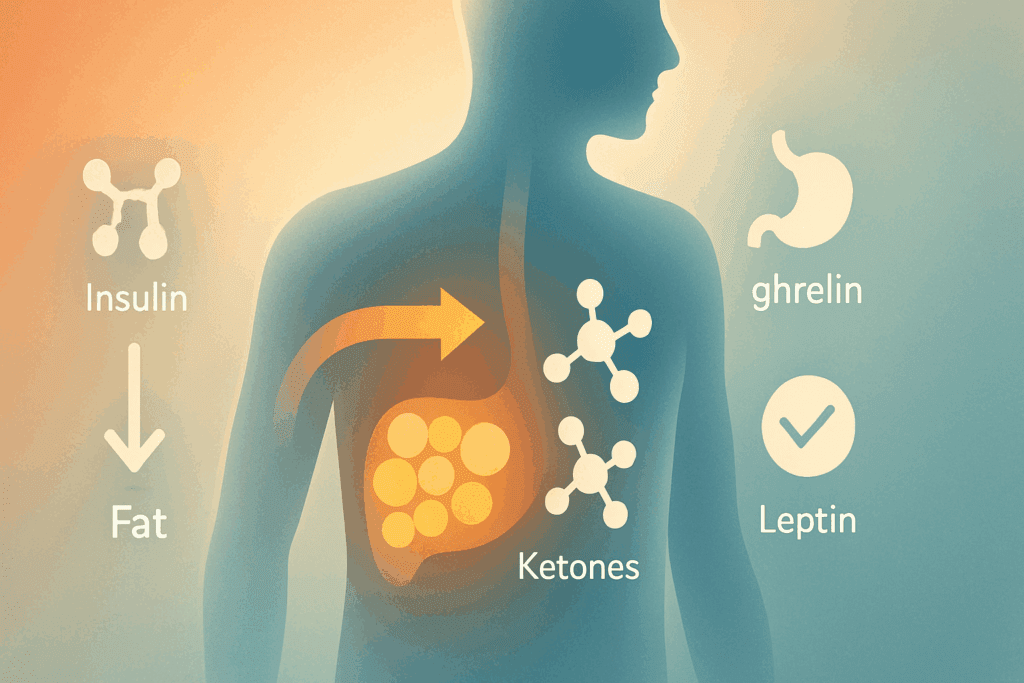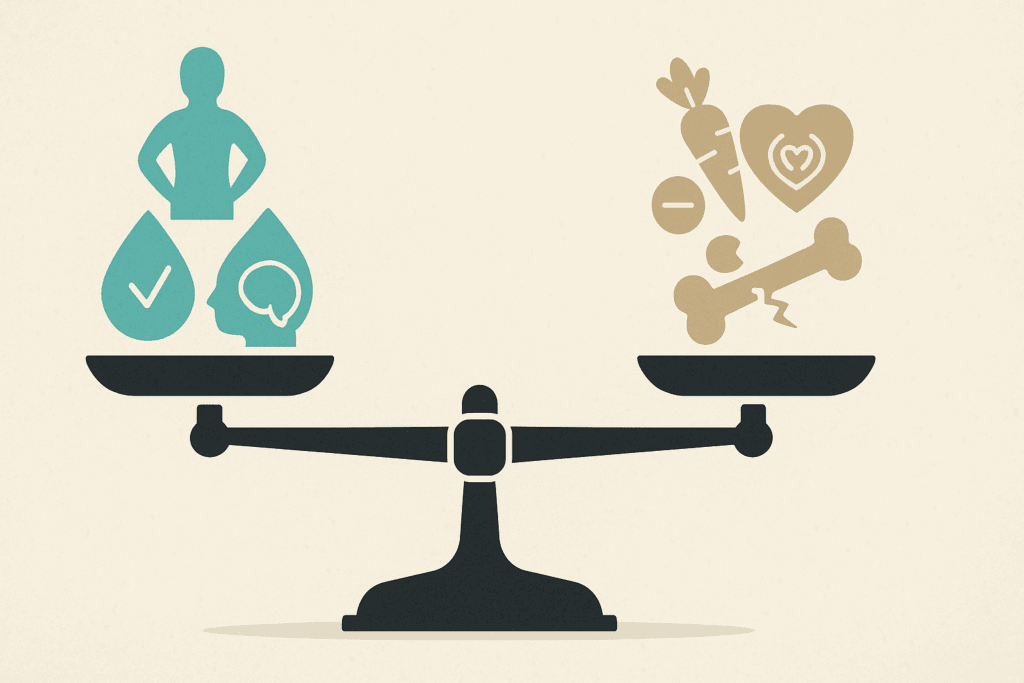For decades, dietary debates have sparked passionate discussions among health professionals, researchers, and individuals striving to optimize their wellness. Among the most polarizing nutritional approaches is the ketogenic diet, commonly known as keto. Rooted in a high-fat, moderate-protein, and extremely low-carbohydrate framework, the keto diet has garnered praise and criticism in equal measure. While some hail it as a transformative path toward weight loss and metabolic balance, others warn of its sustainability issues and long-term health risks. With growing interest in keto diet results, it becomes essential to critically examine the keto diet pros and cons from a scientific and medically responsible perspective.
Understanding the full scope of this popular lifestyle requires a deeper dive into both the positives of a low carb diet and the negative aspects of a ketogenic diet. What is a positive impact of a keto diet? What drawbacks do researchers continue to explore? And perhaps most importantly, how can individuals determine whether this approach aligns with their personal health goals and metabolic needs? As we explore the positive aspects of ketogenic diet strategies and their possible downsides, we aim to offer a comprehensive, evidence-based evaluation of this widely debated nutritional trend.
You may also like: Is the Keto Diet Safe or Dangerous? What Experts Say About the Risks, Benefits, and Basics of the Ketogenic Diet

Unpacking the Positive Aspects of a Ketogenic Diet
The most frequently cited keto benefits revolve around weight loss, improved metabolic health, and enhanced energy levels. One of the primary reasons individuals turn to the ketogenic diet is its potential to prompt rapid weight loss through a process called ketosis. When carbohydrate intake is significantly reduced, the body shifts from using glucose as its primary fuel to relying on ketones, which are derived from fat. This metabolic adaptation can lead to decreased hunger and enhanced satiety, which may make it easier for some individuals to adhere to a calorie deficit without constant cravings.
In addition to supporting weight loss, a growing body of research highlights the positive aspects of a ketogenic diet in managing blood sugar levels. Several studies have shown that keto can significantly reduce HbA1c in individuals with type 2 diabetes and may even lead to reduced dependence on glucose-lowering medications. For this reason, many healthcare professionals consider the low carb advantages of keto to be particularly valuable for patients struggling with insulin resistance and metabolic syndrome. Although more long-term studies are needed, early evidence suggests that this approach may help stabilize blood glucose and reduce the risk of diabetic complications.
Another commonly cited benefit is mental clarity. While the brain typically relies on glucose, ketones may provide an efficient alternative fuel source that enhances cognitive performance in some individuals. Although this benefit may vary depending on individual factors, anecdotal and preliminary scientific reports suggest that increased focus and reduced brain fog could be among the unexpected advantages of a low carb lifestyle. From a clinical standpoint, these findings are encouraging, particularly for individuals navigating neurological conditions or age-related cognitive decline.

Exploring the Metabolic and Hormonal Shifts of Ketosis
What are the positives of keto when it comes to deeper physiological changes? Beyond weight loss and glucose control, the ketogenic diet initiates a cascade of hormonal shifts that can promote a more favorable internal environment for fat loss and inflammation reduction. For instance, ketosis tends to lower circulating insulin levels, which is beneficial not only for blood sugar regulation but also for reducing the body’s tendency to store fat. Chronically elevated insulin, often seen in high-carb diets, has been associated with weight gain and increased disease risk. In contrast, the keto diet fosters an insulin-sensitive state that may offer protective metabolic benefits.
Moreover, the diet may influence the production of ghrelin and leptin—two hormones involved in hunger and satiety regulation. Individuals following a ketogenic plan often report decreased appetite, likely due to more stable blood sugar levels and reduced ghrelin secretion. In turn, these hormonal changes may contribute to the sustainability of the diet for those seeking to manage their weight long-term. Understanding these biochemical responses offers further insight into what a positive impact of a keto diet could look like on a systemic level.
There’s also emerging evidence that ketogenic diets might improve markers of inflammation and oxidative stress, particularly in individuals with obesity or metabolic syndrome. Reduced levels of C-reactive protein (CRP), a key inflammatory marker, have been observed in several small-scale studies. Though more rigorous, long-term trials are necessary, these findings suggest that the positive aspects of a ketogenic diet may extend to cardiovascular and inflammatory health—key concerns for many adults navigating chronic disease risk.

Keto Diet Results: Success Stories and Scientific Validation
As keto continues to gain momentum, its proponents often point to compelling success stories. From individuals shedding significant amounts of weight to those reversing metabolic abnormalities, the keto diet results shared in medical case studies and personal testimonials are often striking. While anecdotal evidence must be interpreted cautiously, especially in the absence of controlled variables, these stories can offer valuable insights into the diet’s real-world applications.
Controlled clinical trials lend further credibility to these claims. A number of randomized controlled trials (RCTs) have demonstrated that individuals on a ketogenic diet can lose more weight and experience greater improvements in triglyceride and HDL cholesterol levels than those on traditional low-fat diets. These outcomes underscore the low carb diet pros and cons compared to conventional eating patterns, particularly for individuals with specific metabolic goals. Importantly, these results suggest that the keto diet pro is not limited to theoretical constructs but is borne out by empirical data.
Nevertheless, success often hinges on adherence and customization. While some thrive on the structure and simplicity of the keto model, others struggle with its restrictions or encounter adverse effects. Thus, it’s crucial to contextualize keto diet results within the framework of individual variability, including genetics, lifestyle, and health history. What works spectacularly for one person may not be sustainable or beneficial for another—a nuance often overlooked in mainstream narratives.
The Hidden Low Carb Advantages Often Overlooked
While weight loss and blood sugar control dominate discussions about keto, there are lesser-known yet equally important low carb advantages that deserve recognition. One such benefit involves the gut microbiome. Though more research is needed, early studies suggest that ketogenic diets may reduce gut dysbiosis in certain populations. Improvements in microbial balance, particularly reductions in pro-inflammatory bacterial strains, have been noted in individuals transitioning from a standard Western diet to a low-carb approach. Although this effect is still under investigation, it reflects a promising area for future exploration.
Another positive lies in the potential for improved skin health. Some individuals report reduced acne or eczema flare-ups after adopting a ketogenic lifestyle, potentially due to lower insulin levels and reduced intake of processed carbohydrates. These improvements may not be universal, but they highlight the broader systemic changes triggered by a low carb approach. When assessing the positives of low carb diet strategies, these peripheral benefits—though often anecdotal—warrant further investigation through rigorous scientific methods.
There’s also some evidence that ketogenic diets may offer neuroprotective effects, particularly in contexts such as epilepsy, Alzheimer’s disease, and even traumatic brain injury. The original therapeutic use of the ketogenic diet was, in fact, for epilepsy treatment in children—a use that remains relevant today. The idea that this same dietary pattern may support brain resilience in aging populations is now under serious scientific scrutiny, expanding the list of potential keto benefits beyond metabolic health.

Confronting the Negative Aspects of a Ketogenic Diet
Despite its many positive qualities, the keto diet is not without drawbacks. One of the primary negative aspects of a ketogenic diet is its restrictive nature. Eliminating entire food groups—particularly fruits, legumes, and whole grains—can create nutritional gaps and diminish dietary diversity. While supplementation may mitigate these risks, a long-term deficiency in fiber, certain vitamins, and phytonutrients could increase the risk of digestive issues or nutrient imbalances.
In the early stages of adaptation, many people experience what’s colloquially known as the “keto flu.” This cluster of symptoms—ranging from headaches and fatigue to irritability and nausea—stems from rapid electrolyte shifts and carbohydrate withdrawal. While typically short-lived, this adjustment period can discourage adherence and create a negative initial impression of the diet. The extent and duration of the keto flu vary, but its presence underscores the need for careful planning and medical oversight, especially for beginners.
Another critical concern is the impact of long-term adherence on cardiovascular health. While some individuals see improved lipid profiles, others may experience elevated LDL cholesterol levels, which remain a contentious issue in the medical community. The pros and cons of keto diet strategies must be assessed on a case-by-case basis, particularly when it comes to heart disease risk. The complexity of lipid metabolism means that simple interpretations of cholesterol levels can be misleading without a full assessment of particle size, inflammation, and other contextual markers.

Pros and Cons of Keto Diet for Different Populations
No diet functions in a vacuum, and the pros and cons to ketogenic diet plans differ based on demographic, medical, and lifestyle factors. For individuals with epilepsy or insulin resistance, the positives of low carb diet patterns may outweigh the limitations. However, for athletes, pregnant women, or those with certain chronic conditions, a restrictive eating plan may introduce new complications. For instance, endurance athletes often require higher glycogen stores to sustain performance—a need that may be difficult to meet under strict keto guidelines.
In pediatric populations, the ketogenic diet is used therapeutically but requires careful monitoring by specialized healthcare providers to avoid growth or developmental concerns. For older adults, potential risks include reduced muscle mass or bone mineral density, especially if protein intake is insufficient. These examples illustrate that while keto benefits can be substantial, they must be interpreted through the lens of personalized medicine. Understanding the low carb diet pros and cons in specific populations is essential for making responsible dietary recommendations.
It’s also worth noting that cultural and psychological dimensions can influence dietary success. Social settings, family traditions, and emotional relationships with food all play a role in determining whether a person can maintain a ketogenic lifestyle long-term. These factors may not be as easily measured in clinical studies, but they are vital in assessing the sustainability of any diet, especially one as rigid as keto.

Navigating the Pros and Cons Keto Brings to Long-Term Health
One of the more complex questions in nutrition science is whether short-term success can translate into long-term health. In the case of keto, this issue remains unresolved. While initial keto diet results may be impressive, questions persist about the diet’s impact over multiple years or decades. Some longitudinal studies suggest potential concerns around kidney health, bone metabolism, or thyroid function when carbohydrate restriction is prolonged. These findings, while not definitive, call for a cautious and balanced approach.
Conversely, advocates argue that many of these concerns can be mitigated through nutrient-dense food choices, regular medical supervision, and appropriate supplementation. For instance, incorporating leafy greens, healthy fats, and adequate electrolytes can help offset some of the negative aspects of a ketogenic diet. Understanding both the risks and benefits allows individuals to tailor the diet to their unique needs and risk profiles. As with any medical or nutritional intervention, informed decision-making is key.
The pros and cons keto brings to long-term wellness must be interpreted in the context of evolving scientific evidence. What is a positive impact of a keto diet today may shift as more robust data becomes available. Therefore, continued research, honest dialogue, and patient-centered care are crucial to responsible dietary implementation.
Frequently Asked Questions: Keto Diet Pros and Cons
1. Can a ketogenic diet impact mental health and emotional well-being?
Yes, the ketogenic diet can influence emotional balance and mental health in ways that go beyond energy and cognition. Some individuals report improved mood stability and fewer episodes of anxiety or irritability, particularly due to the steady fuel source provided by ketones. The positive aspects of a ketogenic diet may include a reduction in mood swings commonly triggered by blood sugar fluctuations. However, this benefit is not universal. For others, the social isolation from restrictive eating or the initial adaptation period may negatively impact mental health. Therefore, when assessing the keto diet pros, it’s essential to include psychological dimensions as part of the overall picture.
2. Are there hidden challenges with electrolyte balance on keto?
One of the most overlooked negative aspects of a ketogenic diet is the impact on electrolytes. As the body excretes more sodium and water due to lower insulin levels, deficiencies in potassium, magnesium, and sodium can occur. These imbalances may contribute to fatigue, muscle cramps, and insomnia—symptoms often mistaken for unrelated health issues. While the positives of low carb diet patterns include reduced bloating and improved blood pressure in some individuals, neglecting electrolyte management can offset those gains. To maximize keto benefits, proactive electrolyte supplementation and hydration should be part of the daily routine.
3. What are the social and cultural implications of following a keto lifestyle?
The pros and cons to ketogenic diet plans often extend beyond physiology into one’s social life. Dining out, attending events, or maintaining cultural food traditions can become challenging when following a restrictive plan like keto. While there are keto diet pros such as reduced cravings and improved meal timing, some individuals find the social limitations to be a significant barrier to long-term adherence. Cultural diets that emphasize rice, beans, or bread may not align well with the low carb model, which can create dissonance for people who value culinary heritage. This underscores the importance of balancing low carb advantages with one’s lifestyle and cultural priorities.
4. Does keto affect athletic performance or endurance training?
There is a growing discussion around the keto diet pro and con considerations for athletic populations. While fat-adapted athletes may experience enhanced endurance during low-intensity exercise, high-intensity performance may decline without adequate carbohydrate availability. The keto diet results for athletes often depend on sport type, duration, and individual metabolic flexibility. Although one of the positives of low carb diet regimens is improved fat oxidation, this may not translate into peak explosive performance. Athletes need to consider whether the pros and cons of keto diet approaches match their specific performance goals and training demands.
5. How does keto interact with hormonal health, especially in women?
Hormonal balance is a nuanced aspect of nutrition that is sometimes disrupted by extreme dietary shifts. For some women, the positive aspects of ketogenic diet interventions include reduced symptoms of polycystic ovarian syndrome (PCOS) due to improved insulin sensitivity. However, others may experience disruptions in menstrual regularity or thyroid function, especially if calorie or carb intake is too low. These hormonal fluctuations are often under-discussed when exploring what are positives are there of keto. A nuanced, individualized approach is critical, especially for women of reproductive age or those with existing endocrine conditions.
6. Is keto sustainable for long-term health and aging?
The question of sustainability reveals both the keto benefits and limitations. While short-term keto diet results may be compelling, including weight loss and better metabolic markers, the long-term impact on aging is less clear. Some experts suggest that sustained low insulin levels could benefit longevity, while others worry about potential micronutrient deficits or reduced muscle mass over time. The low carb diet pros and cons must be evaluated in the context of aging, as older adults may have different nutritional requirements. Incorporating occasional carb cycling or strategic refeeding may help extend the positive impact of a keto diet without compromising long-term wellness.
7. Can keto improve skin health or reduce inflammation-related skin conditions?
Emerging research and anecdotal reports suggest that the positive aspects of ketogenic diet patterns may include improvements in skin conditions such as acne, psoriasis, and eczema. These improvements are likely due to decreased inflammation, reduced insulin levels, and the elimination of processed sugars. However, individual responses vary. Some may experience initial breakouts during the adaptation phase, particularly if hydration or detox pathways are compromised. While skin health isn’t always highlighted in discussions around keto diet pros, it may represent a meaningful benefit for people with chronic inflammatory skin issues.
8. Are there any niche or therapeutic uses for keto beyond weight loss and diabetes?
Yes, one of the lesser-known keto benefits is its use in neurological and oncological settings. For instance, keto has been explored as an adjunct therapy for glioblastoma, Alzheimer’s disease, and even autism spectrum disorders. These applications are still emerging and require careful clinical supervision, but they underscore that the keto diet pro may extend well beyond traditional weight loss narratives. Researchers are also examining whether ketogenic protocols can benefit individuals with multiple sclerosis or chronic migraines. These niche applications expand our understanding of what is a positive impact of a keto diet in medical settings.
9. How does keto affect gut health and digestion?
Gut health is a key area where the pros and cons keto presents become more complicated. On one hand, reducing refined carbs and sugars may starve out pathogenic bacteria and yeast overgrowth. On the other, a lack of fermentable fibers from legumes, fruits, and whole grains may reduce beneficial short-chain fatty acid production. While many see improved digestion and fewer IBS symptoms as positives of low carb diet habits, others may experience constipation or reduced microbial diversity. Using keto-friendly sources of fiber, such as chia seeds or leafy greens, is essential for supporting a balanced gut microbiome.
10. What are some warning signs that keto might not be right for someone?
Despite its many advantages, there are scenarios where the negative aspects of ketogenic diet practices outweigh the benefits. Persistent fatigue, disrupted sleep, chronic constipation, or elevated cholesterol may indicate poor adaptation or underlying metabolic mismatches. While the question of what are positives are there of keto has many answers, these signs suggest that the plan needs adjustment or may not be the right fit. It’s also essential to differentiate between temporary adaptation effects and longer-term complications. Working with a healthcare provider familiar with the pros and cons of keto diet strategies can help determine whether this approach supports or hinders an individual’s health goals.
Conclusion: Weighing Keto Diet Pros and Cons for Informed Health Decisions
In the end, the ketogenic diet represents both promise and complexity. It offers undeniable benefits for certain metabolic conditions and can serve as a powerful tool for weight management, glucose control, and perhaps even cognitive health. At the same time, it poses real challenges—from restrictive food choices to potential long-term risks that are not yet fully understood. The low carb advantages that make keto appealing are balanced by the need for careful nutritional planning and individualized support.
For those wondering what are positives are there of keto, the answers are plentiful but nuanced. Increased energy, improved blood sugar control, and successful weight loss are among the most commonly reported outcomes. However, the negative aspects of ketogenic diet adherence—particularly when implemented without proper guidance—should not be overlooked. Individuals considering this approach must evaluate the pros and cons to ketogenic diet plans in light of their own health status, lifestyle, and goals.
As science continues to evolve, so too will our understanding of keto benefits and risks. What remains clear is the importance of evidence-based, patient-specific strategies. By integrating the latest research with personal health goals, individuals can make informed, confident decisions about whether keto represents the right path for them. In doing so, they ensure that their pursuit of wellness is grounded not only in trend but in truth—a principle at the heart of the EEAT framework and essential for sustainable health outcomes.
Further Reading:
10 Health Benefits of Low-Carb and Ketogenic Diets
The Potential Health Benefits of the Ketogenic Diet: A Narrative Review
Pros and Cons of the Keto Diet


